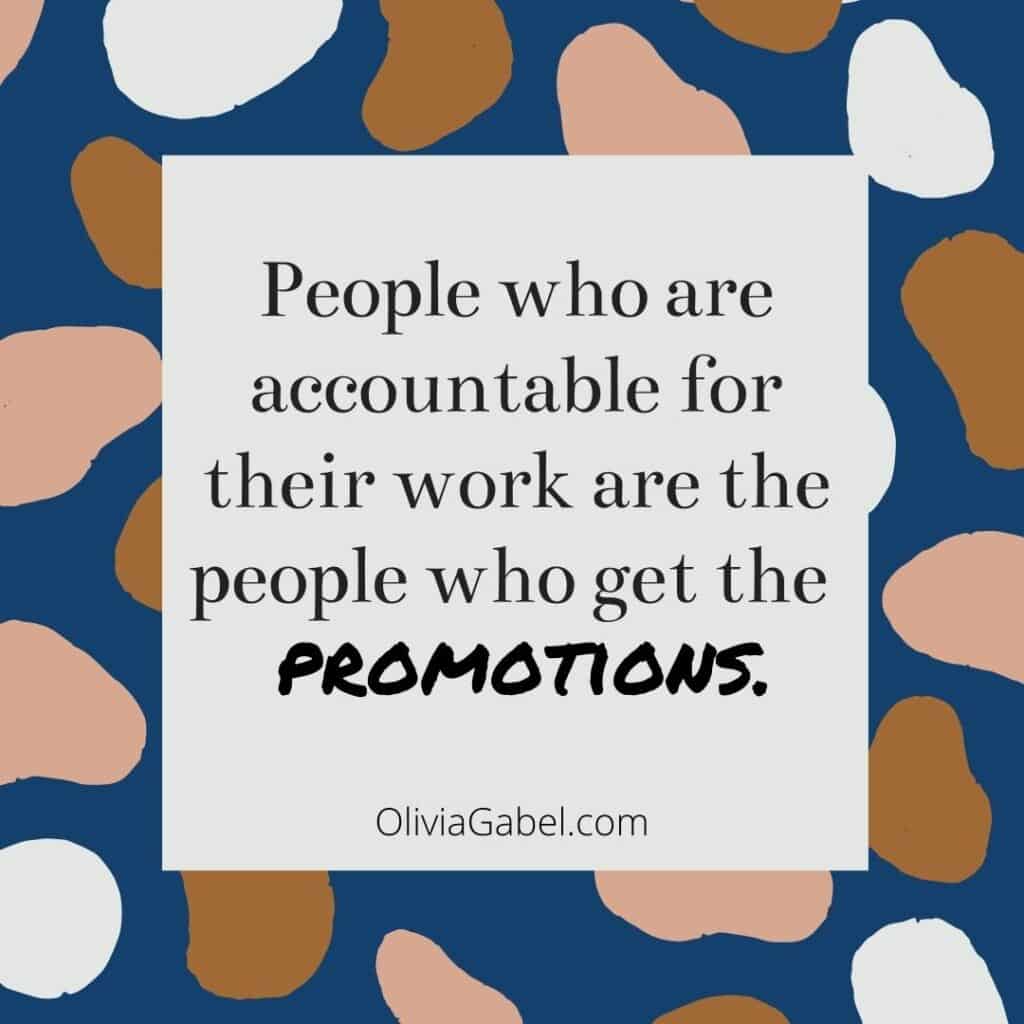Do you ever wonder why you aren’t getting promoted at work? Have you noticed the same person is always getting the best project opportunities, the most spotlight, and promoted faster, even though you have been doing the same job twice as long?
Let’s call her Rachel.
Rachel is also the person that everyone goes to with questions, concerns, and thoughts even though she isn’t the expert.
What is so special about Rachel?
Nothing.
There is a word often attached to people like Rachel. Rachel is accountable. But the truth is anyone can do what Rachel does. Anyone can be accountable.
All you have to do is say what you are going to do and then actually do it. That’s it!
I know you’re thinking, “That’s too easy!”
Wrong. It’s not easy.
While it might be easy to commit, it is very difficult to follow through. When you are accountable, you own and take the responsibility for your work and delivering it.
The Accountability Difference

When Rachel gets stuck on a problem and doesn’t know the answer, she will not:
1. Immediately ping her manager asking what to do next.
2. Stop until someone asks her for an update, at which time she will say she is blocked.
3. Stop, pick up an entirely new task and then get stuck on that one too.
All three of the scenarios above will end in large amounts of eye-rolling from your boss (whether you see it or not).
When Rachel is stuck, she will problem-solve on her own.
This usually only requires a few additional clicks (maybe pinging her tech lead, project manager, or someone else on her team). She might do a quick google search or company intranet search.
This is what some people also call ‘being a self-starter.’
Rachel’s problem solving does not take hours or days. When she cannot find the answer on her own, she will reach out to her boss with a specific request. Her request does not transfer Rachel’s work to her boss.
And then, BAM! Rachel completes her work, just like she said she would.
Be Careful of Overcommitting and Under-committing.
Committing to anything, whether it is completing a deliverable by a specific date, meeting for lunch to discuss a new project idea, or reading a book that someone lent you requires dedicated effort.
And don’t be lazy. Your team can see right through it.
But wait! In real life, things happen.
You’re right. In real life:
- There is a feature that runs into a development problem and is now behind schedule.
- There is a meeting that is running over, so you will be late for lunch.
How can you remain accountable in real-life situations?
Communicate. Communicate. Communicate.
Proactively and as early as possible.
Reach out to the person you are meeting for lunch as soon as you know you will be late. Escalate the potential delay in the application feature deliverable.
People tend to think escalating is bad (I’m not saying you should immediately email your CEO). But it would help if you let your project manager, boss, tech lead, (or whoever your escalation point is) know when things go awry.
Don’t wait until someone asks you for an update to say you are stuck (this is infuriating).
Making excuses and telling people things are going to be late right before they are due is a sure-fire way to lose way more than accountability.
There is Not a Secret Sauce.
You get the accountability that you take. It is as easy as that.
People who are accountable for their work and actions are the people who get promoted, get the bonuses, and are ‘tapped on the shoulder’ with new opportunities.
Rachel isn’t special. She is just willing to be accountable.
Want more great tips and inspiration to learn how you can turn your passion into a career? Start here.



